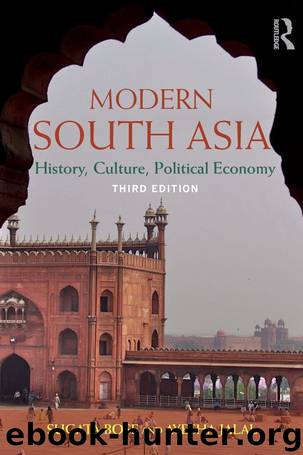Modern South Asia: History, Culture, Political Economy by Sugata Bose

Author:Sugata Bose [Bose, Sugata]
Language: eng
Format: epub
Tags: Non-Fiction, History
ISBN: 9780415779432
Amazon: 041577943X
Publisher: Routledge
Published: 2011-02-11T05:00:00+00:00
to do was rubber-stamp the multifarious discontents seething in the Indian countryside and, to a limited extent, in towns as well.
As the year drew on, however, the movement showed signs of flagging in some regions and a tendency towards increased radicalism in others. Peasant movements began to display a no-rent mentality which directly affected Indian rentier landlords. In certain regions, such as east Bengal, mostly Muslim peasant debtors rose against mostly Hindu moneylenders, giving what was at this stage a primarily economic struggle a potentially communal complexion. Revolutionary violence, which had reared its head during the militant student, youth and workers' movements of 1928–9, showed few signs of abating. Bhagat Singh, who had assassinated a British police officer in Punjab in 1928 and hurled a bomb inside the central legislative assembly in 1929, was widely regarded as a folk-hero in 1930–1. Among the more daring revolutionary acts were the Chittagong armoury raid in April 1930 and the assault on Writers' Building, the seat of government in Calcutta, by three young men—Benoy, Badal and Dinesh—in December 1930. Gandhi's peasant followers often had to rely on these types of revolutionaries in the face of British repression. In Midnapur district of Bengal, where Gandhian civil disobedience was especially strong, the British district magistrate wrote in 1930: 'We have not got the force to deal with these mobs with lathis and the effect of lathis is insufficient. The best thing that could happen would be to have a few more shootings…unless this is done collection of taxes will I am certain be extremely difficult.' A few more shootings did take place in this district. The district magistrate and two of his successors were among those who were killed. Sometimes individual terrorism impeded mass movements in India, but on other occasions the two were closely connected and complemented and strengthened each other.
Unbridled revolutionary or radical fervour was not something which the Mahatma was inclined to encourage. So he opened talks with Viceroy Irwin. Winston Churchill, a diehard imperialist temporarily in the political wilderness, may have found it 'nauseating' to see 'a half-naked fakir' striding up the steps of the viceregal palace to 'parley on equal terms' with the representative of the king-emperor. But most nationalists, and people who had responded to the call of civil disobedience with alacrity, were dismayed that Gandhi was again abandoning their struggle at the wrong moment
Download
This site does not store any files on its server. We only index and link to content provided by other sites. Please contact the content providers to delete copyright contents if any and email us, we'll remove relevant links or contents immediately.
| Archaeology | Essays |
| Historical Geography | Historical Maps |
| Historiography | Reference |
| Study & Teaching |
Underground: A Human History of the Worlds Beneath Our Feet by Will Hunt(12098)
Sapiens by Yuval Noah Harari(5370)
Navigation and Map Reading by K Andrew(5156)
The Sympathizer by Viet Thanh Nguyen(4390)
Barron's AP Biology by Goldberg M.S. Deborah T(4150)
5 Steps to a 5 AP U.S. History, 2010-2011 Edition (5 Steps to a 5 on the Advanced Placement Examinations Series) by Armstrong Stephen(3733)
Three Women by Lisa Taddeo(3433)
Water by Ian Miller(3185)
The Comedians: Drunks, Thieves, Scoundrels, and the History of American Comedy by Nesteroff Kliph(3079)
Drugs Unlimited by Mike Power(2594)
A Short History of Drunkenness by Forsyth Mark(2297)
DarkMarket by Misha Glenny(2212)
And the Band Played On by Randy Shilts(2209)
The House of Government by Slezkine Yuri(2206)
The Library Book by Susan Orlean(2069)
Revived (Cat Patrick) by Cat Patrick(1991)
The Woman Who Smashed Codes by Jason Fagone(1973)
The Absolutely True Diary of a Part-Time Indian by Sherman Alexie(1913)
Birth by Tina Cassidy(1904)
